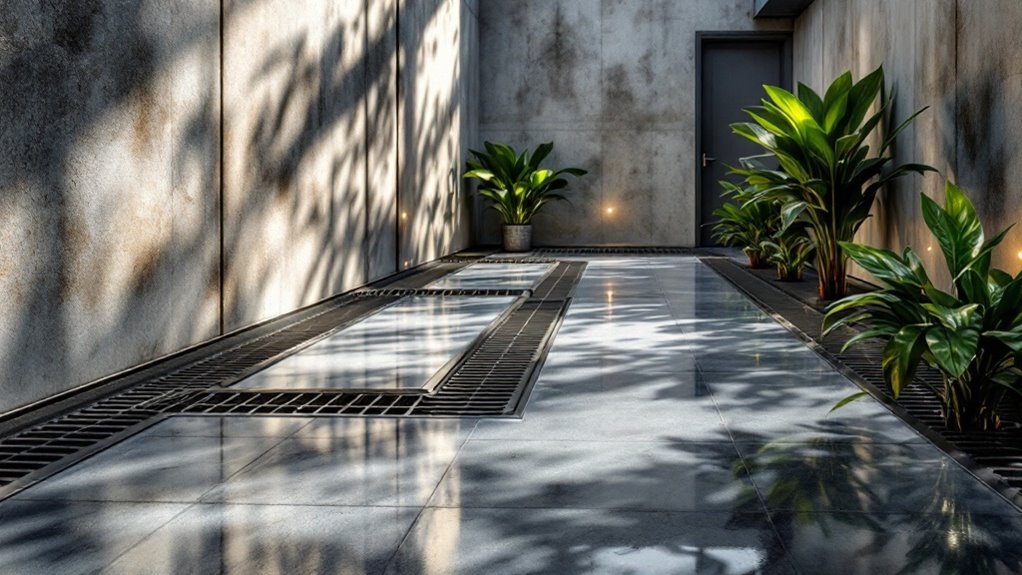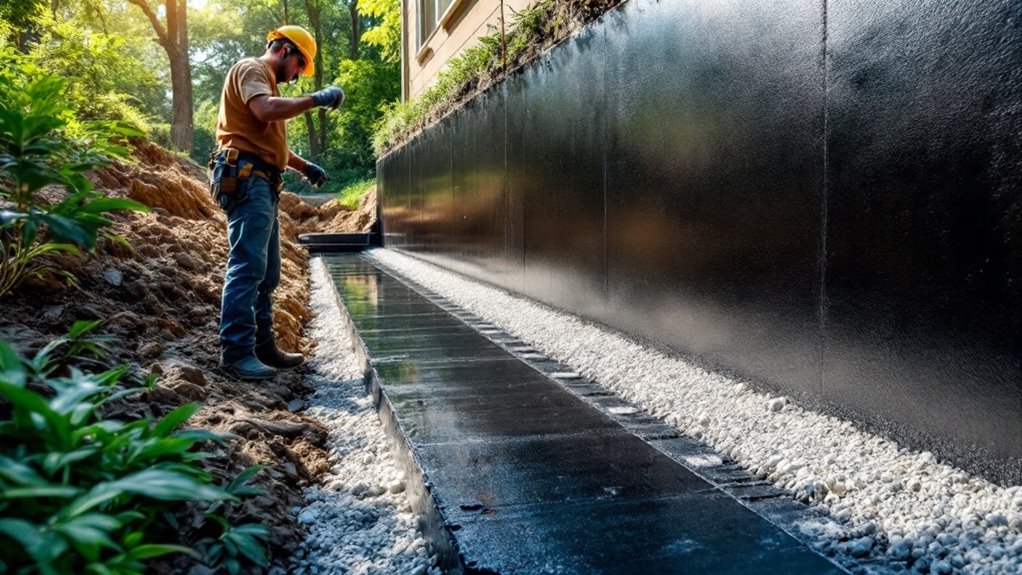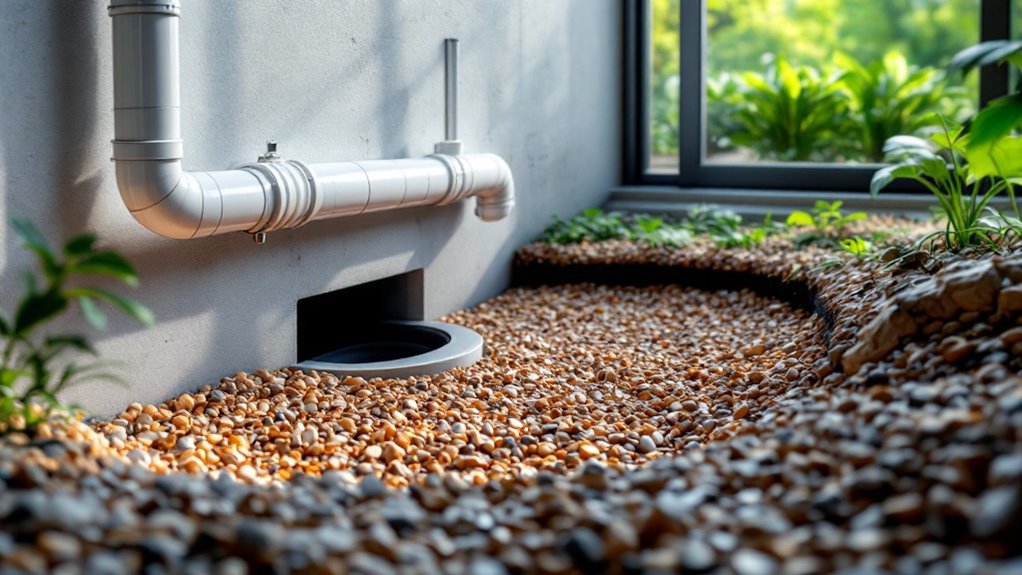Think of your basement as a fortress; it needs to withstand the relentless onslaught of moisture. If you want to keep your space dry and usable, you must understand the best ways to waterproof it permanently. From effective drainage systems to innovative waterproofing products, there are several strategies to investigate. So, what’s the first step you should take to protect your home from water damage?
Key Takeaways
- Install proper exterior drainage systems, including gutters and downspouts, to divert water away from the foundation effectively.
- Apply waterproofing sealants to walls and floors to block moisture entry and prevent damage.
- Utilize interior drainage solutions, such as sump pumps and French drains, to manage groundwater and redirect excess moisture.
- Maintain a controlled environment with dehumidifiers to reduce humidity levels and prevent condensation and mold growth.
- Hire professional waterproofing services for a thorough assessment and tailored solutions that ensure long-lasting protection against water intrusion.
Understanding the Causes of Basement Moisture

While basements can serve as valuable storage or living spaces, understanding the causes of moisture is crucial to maintaining a dry environment. One major culprit is poor drainage around your home. When rainwater collects near the foundation, it can seep into your basement. Furthermore, high humidity levels can lead to condensation on cold surfaces, increasing moisture. Cracks in walls or floors likewise allow water to enter, especially during heavy storms or melting snow. Finally, plumbing leaks can create unexpected dampness. By recognizing these causes, you can take proactive steps to address them before they lead to more significant issues, such as mold growth or structural damage. Keeping your basement dry starts with knowing what to look for. Regular drainage system maintenance can significantly reduce the risk of water accumulation around your home.
Interior Waterproofing Solutions
To keep your basement dry and functional, you’ll want to investigate effective interior waterproofing solutions. These methods help manage moisture from within, ensuring a healthier environment. Here are some options to evaluate:
| Solution | Description | Benefits |
|---|---|---|
| Sealants | Apply waterproof sealants to walls | Blocks moisture entry |
| Interior Drainage | Install a sump pump and drainage system | Redirects water away |
| Dehumidifiers | Use to remove excess humidity | Reduces mold growth |
| Insulation | Insulate walls with moisture-resistant materials | Keeps basement dry |
Additionally, implementing these strategies can significantly contribute to preventing further destruction caused by water damage.
Exterior Waterproofing Techniques

When it comes to keeping your basement dry, exterior waterproofing techniques are essential. You’ll want to focus on proper drainage systems, foundation waterproofing membranes, and even landscaping that directs water away from your home. These strategies work together to prevent water from seeping into your basement and causing damage. Additionally, consider installing a sump pump to effectively manage groundwater and further protect your basement from potential flooding.
Proper Drainage Systems
Ensuring proper drainage systems around your home is vital to effective exterior waterproofing. Start by directing water away from your foundation with gutters and downspouts that work efficiently. Make sure downspouts discharge at least five feet from your home. Furthermore, consider installing a French drain, which collects and redirects groundwater, preventing pooling near your foundation. Regularly inspect your yard’s grading; it should slope away from your house to promote drainage. Outdoor features like swales or dry wells can help channel water as well. Finally, maintain your drainage systems by clearing debris regularly to avoid blockages. By implementing these measures, you can greatly reduce the risk of water intrusion and protect your basement from moisture issues.
Foundation Waterproofing Membranes
While proper drainage is vital, applying foundation waterproofing membranes can markedly improve your home’s defense against water intrusion. These membranes act as a barrier, preventing moisture from seeping through your foundation walls. You’ll typically find them in two forms: liquid-applied and sheet membranes. Liquid-applied membranes create a seamless layer, while sheet membranes offer a durable option that can be installed quickly. When choosing a membrane, consider your foundation type and local climate. Proper installation is critical, so you might want to hire professionals to guarantee it’s done right. By investing in foundation waterproofing membranes, you not only protect your basement but additionally boost your home’s overall value and longevity. Don’t underestimate the importance of this vital step!
Landscaping for Drainage
Effective landscaping can greatly improve your home’s drainage system, helping to prevent water from pooling around your foundation. Start by grading your yard so that it slopes away from your home. This simple adjustment directs rainwater and melting snow away from your foundation. Next, incorporate plants with deep root systems; they absorb excess water and stabilize the soil. You might as well want to install rain gardens or dry wells to capture runoff and allow it to drain slowly. Furthermore, consider using permeable paving for driveways and walkways, which reduces surface runoff. Finally, keep gutters clean and make certain downspouts direct water at least five feet from your foundation. These landscaping strategies create a healthier environment while protecting your basement from moisture issues.
Proper Drainage Systems

To prevent water from seeping into your basement, a well-designed drainage system is essential. Start by installing gutters and downspouts to divert rainwater away from your home’s foundation. Make certain your downspouts extend at least six feet from the base. Next, consider adding a French drain around the perimeter of your basement. This system captures groundwater and directs it to a sump pump or away from your home. A sump pump is imperative for removing any water that accumulates, especially during heavy rains. Finally, regularly inspect and clean your drainage systems to keep them functioning properly. With these steps, you can markedly reduce the risk of water intrusion and protect your basement for the long term.
Utilizing Waterproofing Products
When it comes to waterproofing your basement, choosing the right products can make a significant difference in preventing moisture issues. You’ll find various options tailored to your needs, from sealants to membranes. Here’s a quick overview of some effective waterproofing products:
| Product Type | Purpose |
|---|---|
| Waterproof Sealant | Fills cracks and prevents leaks |
| Liquid Membrane | Creates a barrier against moisture |
| Drainage Mat | Directs water away from walls |
| Sump Pump | Removes water accumulation |
Hiring Professional Waterproofing Services
When it comes to waterproofing your basement, hiring professionals can make all the difference. Their expertise in waterproofing techniques guarantees that your home gets the best protection possible, while a thorough inspection process identifies any potential issues. Plus, many offer long-term warranty options, giving you peace of mind for years to come.
Expertise in Waterproofing Techniques
While DIY waterproofing may seem appealing, hiring professional waterproofing services often guarantees a more effective and lasting solution. Professionals bring specialized knowledge and skills that can help you avoid common pitfalls. Here are some key advantages:
- Expert Assessment: They can accurately identify the root cause of your water issues.
- Advanced Techniques: Professionals use proven methods and materials that are often more effective than DIY options.
- Time-Saving: Their experience allows for quicker and more efficient work, reducing disruption to your home.
- Warranty Protection: Many services offer warranties, giving you peace of mind that the job is done right.
Incorporating these expert techniques can greatly improve your basement’s waterproofing, ensuring a dry and safe environment for years to come.
Comprehensive Inspection Process
A thorough inspection is essential for effective basement waterproofing, as it allows professionals to pinpoint the specific issues affecting your space. When you hire experts, they’ll assess various factors, including the foundation, drainage systems, and any signs of moisture or damage. This detailed evaluation helps identify weaknesses that could lead to water intrusion.
During the inspection, professionals often use specialized tools to detect hidden problems, like leaks or dampness, that you might not notice. They’ll likewise consider the overall surroundings and how it impacts your basement. By addressing these concerns upfront, you can guarantee a tailored waterproofing solution that truly fits your needs, ultimately leading to a healthier, safer basement environment. Don’t underestimate the importance of this critical first step.
Long-term Warranty Options
Choosing professional waterproofing services not only guarantees effective solutions but also frequently comes with valuable long-term warranty options. These warranties provide peace of mind, knowing your investment is protected. Here are some key benefits of choosing a service that offers a long-term warranty:
- Coverage for Repairs: Protects you from unexpected repair costs.
- Confidence in Workmanship: Assures the job is done right the first time.
- Increased Home Value: A waterproofed basement improves your property’s appeal.
- Ongoing Support: Access to expert advice for any future concerns.
Conclusion
By implementing the best waterproofing techniques, you can transform your basement into a dry, usable space. Did you know that nearly 60% of homes have some form of moisture in their basements? Taking proactive steps like installing a thorough drainage system and using waterproof sealants can greatly reduce this risk. With regular maintenance and professional help, you’ll guarantee a permanent solution to basement moisture issues, creating a safer environment for you and your family.
